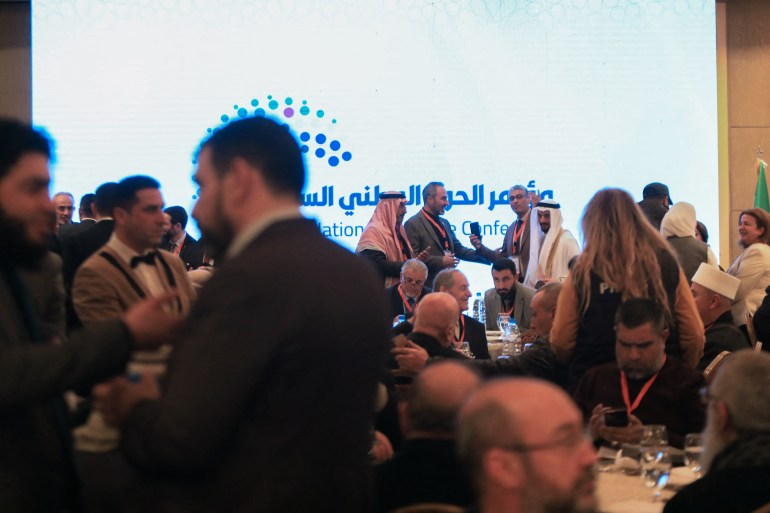Syria’s interim leader launches national dialogue on political transition

As discussions about the country’s future began, the de facto leader of Syria reiterated his commitment to a democratic political transition.
As he welcomed participants in a national dialogue aimed at guiding the country’s political transition following years of civil war and former president Bashar al-Assad’s demise, Ahmed al-Sharaa urged his countrymen to unite and pledged to establish a transitional justice body.
He added that the state would have complete control over weapons, a crucial requirement for a nation where numerous armed groups have recently engaged in combat.
Al-Sharaa and his administration’s Hayat Tahrir al-Sham (HTS) described the meeting as a crucial step toward a democratic and all-inclusive transition and state reconstruction. However, there is concern that the process is being rushed.
In his opening address, Sharaa announced the creation of a transitional justice committee, urging all Syrians to stand together and hold hands to heal the wounds and wash the oppressed from decades of rule.
“Over the past two months, we have worked on pursuing those who committed crimes against Syrians”, al-Sharaa added.
“The unity of arms and their monopoly by the state is not a luxury but a duty and an obligation”, he continued.
Al-Sharaa has previously recommended incorporating the national army into the coalition forces led by Kurdish-led forces that have previously fought al-Assad’s regime.
Many observers, who anticipated it would take one or two more months to set up, were surprised to learn that the conference had been in flux until the last minute when it suddenly announced on Sunday that it would go ahead.
Some confusion and criticism were directed at the organisers as the organising committee was still meeting with community leaders in Syria.
George Sabra, an opposition politician, announced on X that he had been invited to attend Damascus on February 23. He had to turn down because he could not travel to Syria in time and lives in exile in France.
About 600 candidates will take part in a packed agenda for the day’s worth of working sessions, according to local media.
The participants will hold working sessions on transitional justice, the structure of a new constitution, reforming and building institutions, personal freedoms, the role of civil society and the country’s economy.
The conference’s recommendations are non-binding, but the outcome will be closely watched as the world’s vote on whether to ratify sanctions against Syria during al-Assad’s rule is considered.
A new constitution is one of the most crucial expected deliverables, but whether or not that will be accomplished in a single day is still up for debate.
Scepticism
Some people are less skeptical because of the short notice and one-day schedule.
Many in Syria’s minority communities – including Kurds, Christians, Druze and members of Assad’s Alawite sect – are concerned for their future and yet to be convinced by the new rulers ‘ promises of inclusive governance.
HTS was formerly affiliated with al-Qaida, although it broke ties and al-Sharaa has since preached coexistence.
What they called the “token” representation of minority groups was condemned by parties in Syria’s autonomous Kurdish administration.
In a joint statement, the 35 parties said: “Conferences with token representation… are meaningless, worthless, and will not contribute to finding real solutions to the country’s ongoing crisis”.
Dalia Dalati, a public employee who was displaced during the country’s nearly 14-year civil war, said that she does not expect “any results”, and that three months after the fall of al-Assad, the economic and security situations remain tenuous.
One of the invited speakers, Orthodox Archbishop Elia Tohme, criticized the conference as a “too early to assess” whether it offered a meaningful opportunity for citizen input into the new order.
Source: Aljazeera
Leave a Reply